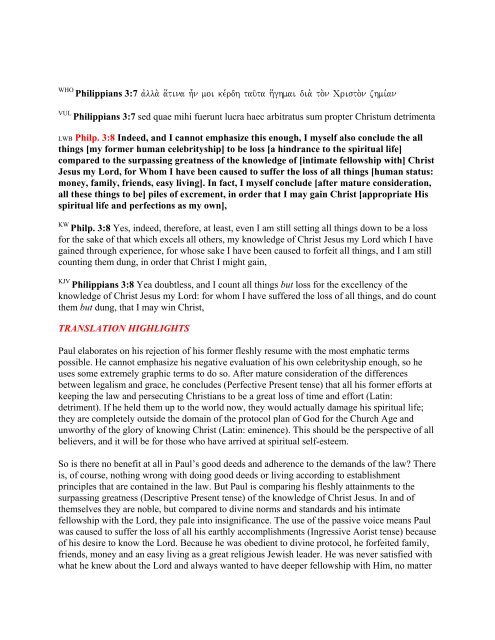Philippians - Verse-by-Verse Biblical Exegesis
Philippians - Verse-by-Verse Biblical Exegesis
Philippians - Verse-by-Verse Biblical Exegesis
Create successful ePaper yourself
Turn your PDF publications into a flip-book with our unique Google optimized e-Paper software.
WHO <strong>Philippians</strong> 3:7 avlla. a[tina h=n moi ke,rdh tau/ta h[ghmai dia. to.n Cristo.n zhmi,an<br />
VUL <strong>Philippians</strong> 3:7 sed quae mihi fuerunt lucra haec arbitratus sum propter Christum detrimenta<br />
LWB Philp. 3:8 Indeed, and I cannot emphasize this enough, I myself also conclude the all<br />
things [my former human celebrityship] to be loss [a hindrance to the spiritual life]<br />
compared to the surpassing greatness of the knowledge of [intimate fellowship with] Christ<br />
Jesus my Lord, for Whom I have been caused to suffer the loss of all things [human status:<br />
money, family, friends, easy living]. In fact, I myself conclude [after mature consideration,<br />
all these things to be] piles of excrement, in order that I may gain Christ [appropriate His<br />
spiritual life and perfections as my own],<br />
KW Philp. 3:8 Yes, indeed, therefore, at least, even I am still setting all things down to be a loss<br />
for the sake of that which excels all others, my knowledge of Christ Jesus my Lord which I have<br />
gained through experience, for whose sake I have been caused to forfeit all things, and I am still<br />
counting them dung, in order that Christ I might gain,<br />
KJV <strong>Philippians</strong> 3:8 Yea doubtless, and I count all things but loss for the excellency of the<br />
knowledge of Christ Jesus my Lord: for whom I have suffered the loss of all things, and do count<br />
them but dung, that I may win Christ,<br />
TRANSLATION HIGHLIGHTS<br />
Paul elaborates on his rejection of his former fleshly resume with the most emphatic terms<br />
possible. He cannot emphasize his negative evaluation of his own celebrityship enough, so he<br />
uses some extremely graphic terms to do so. After mature consideration of the differences<br />
between legalism and grace, he concludes (Perfective Present tense) that all his former efforts at<br />
keeping the law and persecuting Christians to be a great loss of time and effort (Latin:<br />
detriment). If he held them up to the world now, they would actually damage his spiritual life;<br />
they are completely outside the domain of the protocol plan of God for the Church Age and<br />
unworthy of the glory of knowing Christ (Latin: eminence). This should be the perspective of all<br />
believers, and it will be for those who have arrived at spiritual self-esteem.<br />
So is there no benefit at all in Paul’s good deeds and adherence to the demands of the law? There<br />
is, of course, nothing wrong with doing good deeds or living according to establishment<br />
principles that are contained in the law. But Paul is comparing his fleshly attainments to the<br />
surpassing greatness (Descriptive Present tense) of the knowledge of Christ Jesus. In and of<br />
themselves they are noble, but compared to divine norms and standards and his intimate<br />
fellowship with the Lord, they pale into insignificance. The use of the passive voice means Paul<br />
was caused to suffer the loss of all his earthly accomplishments (Ingressive Aorist tense) because<br />
of his desire to know the Lord. Because he was obedient to divine protocol, he forfeited family,<br />
friends, money and an easy living as a great religious Jewish leader. He was never satisfied with<br />
what he knew about the Lord and always wanted to have deeper fellowship with Him, no matter









